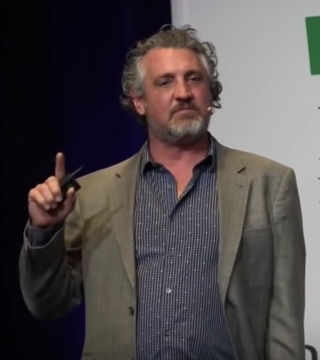Related Research Articles

Susan Adele Greenfield, Baroness Greenfield, is an English scientist, writer, broadcaster and member of the House of Lords. Her research has focused on the treatment of Parkinson's disease and Alzheimer's disease. She is also interested in the neuroscience of consciousness and the impact of technology on the brain.

Diagnoses of autism have become more frequent since the 1980s, which has led to various controversies about both the cause of autism and the nature of the diagnoses themselves. Whether autism has mainly a genetic or developmental cause, and the degree of coincidence between autism and intellectual disability, are all matters of current scientific controversy as well as inquiry. There is also more sociopolitical debate as to whether autism should be considered a disability on its own.

Timothy David Noakes is a South African scientist, and an emeritus professor in the Division of Exercise Science and Sports Medicine at the University of Cape Town.
Thiomersal is a mercury compound which is used as a preservative in some vaccines. Anti-vaccination activists promoting the incorrect claim that vaccination causes autism have asserted that the mercury in thiomersal is the cause. There is no scientific evidence to support this claim. The idea that thiomersal in vaccines might have detrimental effects originated with anti-vaccination activists and was sustained by them and especially through the action of plaintiffs' lawyers.

Paul Allan Offit is an American pediatrician specializing in infectious diseases, vaccines, immunology, and virology. He is the co-inventor of a rotavirus vaccine. Offit is the Maurice R. Hilleman Professor of Vaccinology, professor of pediatrics at the Perelman School of Medicine at the University of Pennsylvania, former chief of the Division of Infectious Diseases (1992–2014), and the director of the Vaccine Education Center at the Children's Hospital of Philadelphia.
Claims of a link between the MMR vaccine and autism have been extensively investigated and found to be false. The link was first suggested in the early 1990s and came to public notice largely as a result of the 1998 Lancet MMR autism fraud, characterised as "perhaps the most damaging medical hoax of the last 100 years". The fraudulent research paper authored by Andrew Wakefield and published in The Lancet falsely claimed the vaccine was linked to colitis and autism spectrum disorders. The paper was retracted in 2010 but is still cited by anti-vaxxers.

Andrew Jeremy Wakefield is a British anti-vaccine activist, former physician, and discredited academic who was struck off the medical register for his involvement in The Lancet MMR autism fraud, a 1998 study that fraudulently claimed a link between the measles, mumps, and rubella (MMR) vaccine and autism. He has subsequently become known for anti-vaccination activism. Publicity around the 1998 study caused a sharp decline in vaccination uptake, leading to a number of outbreaks of measles around the world. He was a surgeon on the liver transplant programme at the Royal Free Hospital in London and became senior lecturer and honorary consultant in experimental gastroenterology at the Royal Free and University College School of Medicine. He resigned from his positions there in 2001, "by mutual agreement", then moved to the United States. In 2004, Wakefield co-founded and began working at the Thoughtful House research center in Austin, Texas, serving as executive director there until February 2010, when he resigned in the wake of findings against him by the British General Medical Council.

Autism Speaks Inc. is a non-profit autism awareness organization and the largest autism research organization in the United States. It sponsors autism research and conducts awareness and outreach activities aimed at families, governments, and the public. It was founded in February 2005 by Bob Wright and his wife Suzanne, a year after their grandson Christian was diagnosed with autism. The same year as its founding, the organization merged with Autism Coalition for Research and Education. It then merged with the National Alliance for Autism Research in 2006 and Cure Autism Now in 2007.
Hurair Vasken Aposhian was a Ph.D. toxicologist and an emeritus professor of molecular and cell biology at the University of Arizona, a post he held beginning in 1975. He is also a former professor of pharmacology at the medical school at said university. He received his bachelor's degree in chemistry, at Brown University, 1948. He received a master's degree and a PhD in physiological chemistry at the University of Rochester, where he published some scientific studies about the synthesis of isoalloxazine ring-containing compounds. He did a postdoctoral with Nobel Laureate Arthur Kornberg in the department of biochemistry at Stanford University School of Medicine. He has done sabbatical scholar-in-residence at MIT and at the University of California at San Diego. He is best known for his pioneering work on Succimer and Unithiol in the treatment of arsenic, mercury, lead and other heavy metals leading to FDA approval of succimer in childhood lead poisoning at levels over 40 ug/dl. Previous posts he had held include at Vanderbilt, Tufts University, and the University of Maryland. His views about mercury in vaccines and in dental amalgams go against the consensus of the medical community and are controversial.
Trace Amounts: Autism, Mercury, and the Hidden Truth is a 2014 anti-vaccination biographic film by Eric Gladen, who claims to have experienced mercury poisoning after receiving a tetanus vaccine. In the film, he presents his investigation on the cause of his condition, argues that vaccines should be made without mercury, and claims that mercury and aluminium content of vaccines is linked to autism, a claim that is contrary to the scientific consensus. The film questions a 2011 journal article which described the vaccine-autism connection as "the most damaging medical hoax of the last 100 years".

Dorit Rubinstein Reiss is a Professor of Law and the James Edgar Hervey '50 Chair of Litigation at UC Hastings College of Law. She has also worked for the Hebrew University of Jerusalem and the Israeli Ministry of Justice's Department of Public Law.

Vaxxed: From Cover-Up to Catastrophe is a 2016 American pseudoscience propaganda film alleging a cover-up by the Centers for Disease Control and Prevention (CDC) of a purported link between the MMR vaccine and autism. According to Variety, the film "purports to investigate the claims of a senior scientist at the U.S. Centers for Disease Control and Prevention who revealed that the CDC had allegedly manipulated and destroyed data on an important study about autism and the MMR vaccine"; critics derided Vaxxed as an anti-vaccine propaganda film.
Christopher Ariel Shaw is a Canadian neuroscientist and professor of ophthalmology at the University of British Columbia.
The Lancet MMR autism fraud centered on the publication in February 1998 of a fraudulent research paper titled "Ileal-lymphoid-nodular hyperplasia, non-specific colitis, and pervasive developmental disorder in children" in The Lancet. The paper, authored by now discredited and deregistered Andrew Wakefield, and twelve coauthors, falsely claimed causative links between the MMR vaccine and colitis and between colitis and autism. The fraud was exposed in a lengthy Sunday Times investigation by reporter Brian Deer, resulting in the paper's retraction in February 2010 and Wakefield being struck off the UK medical register three months later. Wakefield reportedly stood to earn up to $43 million per year selling diagnostic kits for a non-existent syndrome he claimed to have discovered. He also held a patent to a rival vaccine at the time, and he had been employed by a lawyer representing parents in lawsuits against vaccine producers.
Extensive investigation into vaccines and autism spectrum disorder has shown that there is no relationship between the two, causal or otherwise, and that the vaccine ingredients do not cause autism. Vaccinologist Peter Hotez researched the growth of the false claim and concluded that its spread originated with Andrew Wakefield's fraudulent 1998 paper, with no prior paper supporting a link.

Del Matthew Bigtree is an American television and film producer who is the CEO of the anti-vaccination group Informed Consent Action Network. He produced the film Vaxxed: From Cover-Up to Catastrophe, based on the discredited opinions of Andrew Wakefield and alleges an unsubstantiated connection between vaccines and autism.
The Children's Medical Safety Research Institute (CMSRI) was a United States based anti-vaccination group which funded a number of pseudoscientific studies, notably by Christopher Shaw of the University of British Columbia, and his collaborator Lucija Tomljenovic, and by Christopher Exley of Keele University, which purport to link aluminium in vaccines to autism. The studies have been rejected by the World Health Organization and some have been retracted. A claimed "vaccinated vs. unvaccinated" cohort study has also been debunked.

In the United Kingdom, raptor persecution is a crime against wildlife. The offence includes poisoning, shooting, trapping, and nest destruction or disturbance of birds of prey.
References
- ↑ Hall, Sarah (20 April 2006). "Alzheimer's research triggers call for new water poisoning inquiry". The Guardian . Retrieved 23 February 2019.
- ↑ "Brain metal level 'beyond belief'". BBC News . 6 March 2012. Retrieved 23 February 2019.
- ↑ Morris, Steven (5 March 2012). "Camelford water poisoning residents given terrible advice, inquest told". The Guardian. Retrieved 23 February 2019.
- ↑ "Camelford water poisoning: Long-term health effects 'unlikely'". BBC News. 18 April 2013. Retrieved 27 July 2021.
- ↑ "Archived copy" (PDF). Archived from the original (PDF) on 14 May 2014. Retrieved 13 May 2014.
{{cite web}}: CS1 maint: archived copy as title (link) - ↑ "Camelford water poisoning: Unreserved government apology". BBC News . 19 September 2013. Retrieved 8 May 2016.
- ↑ These Scientists Say A British Professor's Claim That Aluminium Is Linked To Autism Is "Absurd", Buzzfeed News
- ↑ “Utterly awful:” David Gorski weighs in on yet another paper linking vaccines and autism, Retraction Watch
- ↑ Funding halted for Professor Chris Exley, who links vaccines to autism, The Times
- ↑ Greenfield, Patrick (9 February 2021). "Keele University accepting funds for researcher who shared vaccine misinformation". The Guardian . Retrieved 9 February 2021.
- ↑ "Vaccines Do Not Cause Autism Concerns". Centers for Disease Control and Prevention . 12 December 2018. Retrieved 7 February 2019.